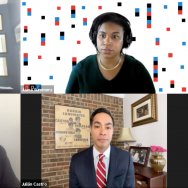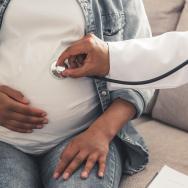The intersecting crises of the COVID-19 pandemic and gun violence have devastated communities across Chicago, creating national headlines while challenging civic leaders to find solutions to save lives. Leading UChicago experts say that confronting the very human toll of gun violence on survivors, families and neighborhoods—and addressing community trauma as a legitimate public health issue—is essential.
On Oct. 20, the UChicago Urban Network hosted a panel exploring the root causes of violence and the trauma-informed, community-based solutions necessary to make meaningful change. The experts included Shannon Watts, founder of Moms Demand Action; Selwyn Rogers, founding director of UChicago Medicine’s Trauma Center; Franklin Cosey-Gay, executive director of the Chicago Center for Youth Violence Prevention; and Pastor Brenda Mitchell, a local gun violence prevention advocate.
“That combination of epidemics has really placed a significant toll on communities of color,” Rogers said. “It reflects the fragile nature of both our health care system and our social network system that, in the midst of the pandemic, things have actually gotten much worse and exacerbated by COVID-19.”
Rogers, a professor of surgery, noted that the sensationalized conversation around violence in Chicago neglects to address the deeper impact of violence on survivors, families and communities and the lifetime of trauma that can be incurred by survivors and those connected to victims and survivors.
“We do focus overwhelmingly in the media on those people who get shot and die as a result of gun violence, but there are so many countless others that are also affected—those who are shot, but also those members of families and communities that are disproportionately affected by gun violence,” Rogers added. “It’s important to address both the physical needs that patients have but also the mental and emotional needs they have, too.”
Since May 2018, UChicago Medicine—in recognition of the need for wraparound services for patients and families who have been impacted by traumatic injury and death—has run a hospital-based Violence Recovery Program (VRP) that has engaged approximately 5,200 patients, 2,200 families and 560 children.
Cosey-Gay talked about the systemic inequalities that have perpetuated violence in communities that have faced generational divestment, and added that violence intervention programs need to be staffed by “credible messengers” who have “lived and experienced pain” in order to be able to secure the trust of survivors through their sensitivity and understanding of “interpersonal violence and structural violence.”
“Given what we understand about violence and what we understand about how persistently high exposure to violence has been in the Chicago context, primarily in Black and Brown communities on the south and west sides of Chicago … we can track resources and how these communities are routinely under resourced,” Cosey-Gay said, citing lack of employment opportunities, cuts to public housing and closures of public schools and mental health centers.
He said the rise of hospital-based violence intervention programs have been critical, and a significant step toward recognizing trauma as a legitimate public health issue.
Mitchell, who lost her son Kenneth to gun violence in 2005, discussed how being a survivor of gun violence is akin to being “the walking wounded” and detailed her own struggles with her mental health as she stepped into being a primary caregiver for Kenneth’s children.
“I did not realize the effect of trauma in my life,” Mitchell said. “I did not know that I was dying on the inside. … I had to take the time to save my own life in order to keep with the boys.”
A key part of violence prevention, according to Watts, is also reducing the number of guns that are in circulation and ensuring that background checks systems are strengthened to ensure that guns do not get in the wrong hands and create more tragedy in hard-hit communities across the country.
“We know that about 100 people are shot and killed every single day in this country. About 200 more are wounded,” Watts said. “Guns are now the leading cause of death in children and teens. And then in communities, especially Black and brown communities that already have a disproportionate level of gun violence, there’s this collective trauma in addition to all the hurt and suffering.
“Gun violence was really an epidemic within the pandemic. And certainly that was exacerbated the surging gun sales that we saw … in the last two years. And because we have loopholes throughout the system of gun sales, guns have easily fallen into the wrong hands.”

